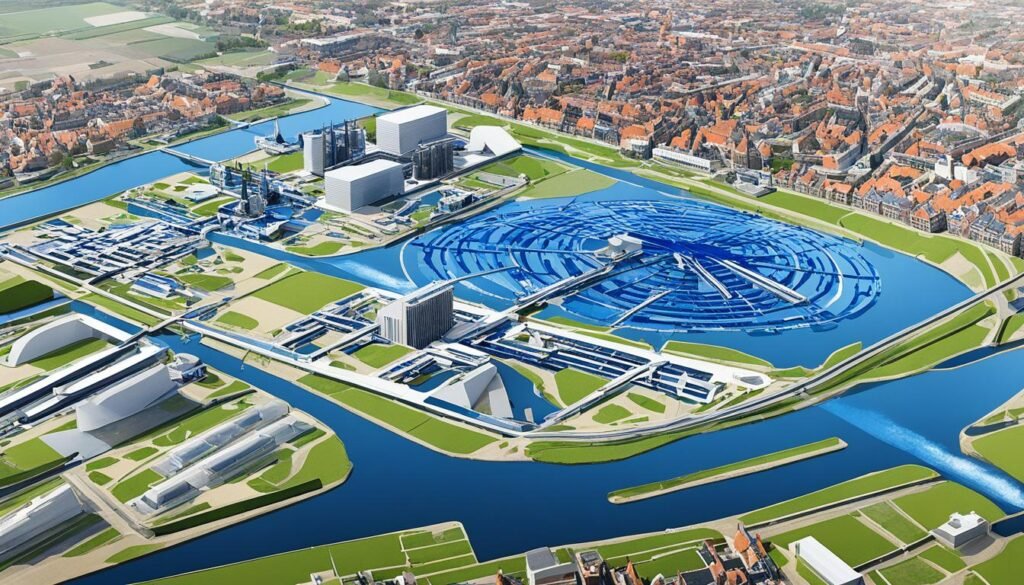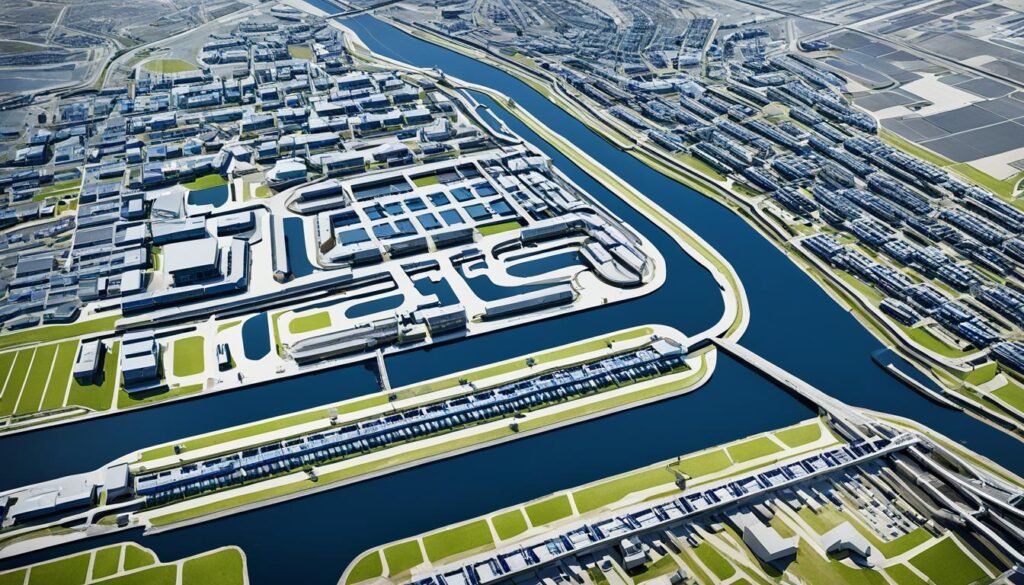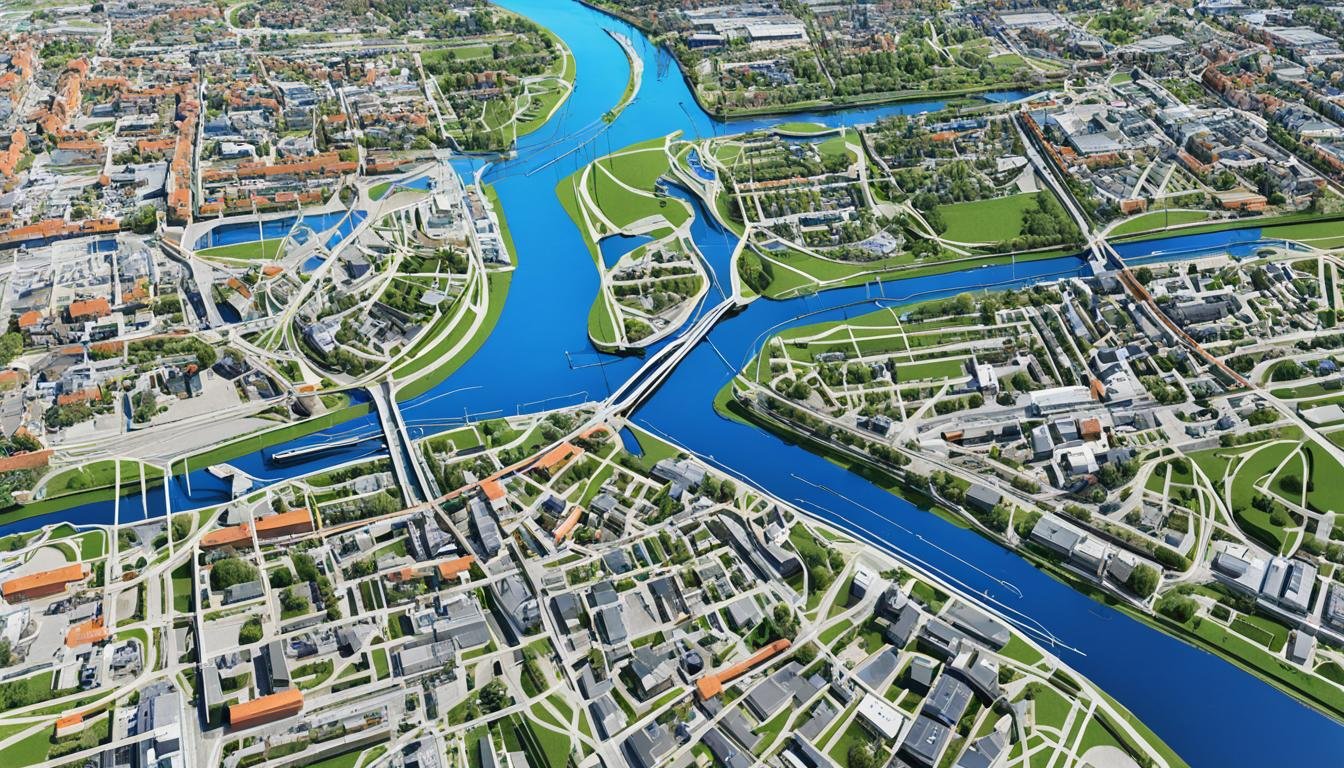Did you know that the Netherlands, a country renowned for its innovative water management, devotes a staggering 9% of its GDP to water-related infrastructure and management? This remarkable figure underscores the critical importance of water engineering in a nation where over 26% of the land area lies below sea level. At the forefront of this water management revolution is the city of Delft, a global center for expertise in hydraulic engineering, flood control systems, and sustainable water resource management.
Delft’s long-standing history of battling the relentless forces of water has imbued the city with a deep understanding of the challenges and solutions inherent in managing a water-abundant environment. From the iconic Delta Works, a series of dams and storm surge barriers that protect the Netherlands from devastating North Sea floods, to the intricate network of polders, dikes, and canals that reclaim land from the water, Delft’s engineers have played a pivotal role in shaping the country’s water landscape.
Beyond the Netherlands, Delft’s water management expertise has garnered global recognition, with the city serving as a hub for innovative research, cutting-edge technologies, and international collaboration in the field of water resources management. As the world grapples with the ever-increasing challenges posed by climate change, sea-level rise, and growing demands on limited water supplies, the lessons and solutions pioneered in Delft have become increasingly vital for communities around the globe.
Key Takeaways
- Delft, Netherlands is a global center for expertise in water management engineering, with a focus on innovative solutions for flood control, coastal defense, and sustainable water resource management.
- The Netherlands devotes a significant portion of its GDP to water-related infrastructure and management, underscoring the critical importance of this sector for the country.
- Delft’s water management expertise has been instrumental in shaping the Netherlands’ iconic Delta Works and extensive network of polders, dikes, and canals.
- Delft’s research and technologies in water management are increasingly relevant for communities worldwide facing the challenges of climate change, sea-level rise, and growing demands on water resources.
- Delft’s water management engineering excellence has made it a global hub for innovative research, cutting-edge technologies, and international collaboration in the field of water resources management.
Introduction to Water Management Engineering
Water management engineering is a multifaceted field that concentrates on the effective management and control of water resources. This discipline encompasses the study of hydrological processes and hydraulic processes, as well as the design and implementation of water system engineering interventions. Delft, located in the Netherlands, has firmly established itself as a global leader in this domain, with its universities and research institutions at the forefront of cutting-edge work addressing a wide range of water-related challenges.
Overview of Delft’s Expertise in Water Management
The Netherlands, being a low-lying country with a significant portion of its land reclaimed from the sea, places a strong emphasis on effective water management engineering to ensure the safety and prosperity of its citizens. Delft’s academic and research institutions have built a reputation for their expertise in this field, with a focus on developing innovative solutions to address the country’s unique water-related needs.
Importance of Water Management for the Netherlands
Given the Netherlands’ vulnerability to flooding and the critical role of water in its economic and social well-being, water management engineering plays a vital role in the country’s long-term sustainability. Delft’s researchers and engineers have been at the forefront of advancing the field, pioneering new techniques and technologies to better understand and manage hydrological processes and hydraulic processes in the Netherlands and beyond.
Water Resources Management
Delft, the Netherlands, has long been recognized as a global leader in water resources management. Researchers in this historic city focus on understanding the complex hydrological and hydraulic processes that shape water systems. By studying the movement and behavior of water above, on, and below the earth’s surface, they develop innovative solutions to address pressing water-related challenges.
Hydrological and Hydraulic Processes
Delft’s experts delve deep into the study of hydrological processes, which encompass the movement, distribution, and quality of water. They analyze precipitation patterns, groundwater flows, and the impact of climate change on the water cycle. Simultaneously, they investigate the hydraulic processes that govern the behavior of water in rivers, canals, and coastal environments. This holistic understanding of the hydrological and hydraulic dynamics is crucial for effective water resources management.
Engineering Interventions in Water Systems
Armed with their expertise in water resources management, the researchers in Delft design and implement innovative engineering solutions to mitigate the impacts of floods, droughts, and other water-related hazards. These interventions range from the development of advanced flood control systems to the implementation of sustainable drought management strategies. By integrating their knowledge of water system engineering, they work to ensure the resilience and sustainability of water resources for communities around the world.

Sanitary Engineering and Urban Water Cycle
In Delft, sanitary engineering professionals focus intently on the treatment and transport of drinking water, wastewater, and industrial water, all while maintaining a keen eye on the urban water cycle. Researchers in this field work diligently to improve water quality, extract valuable raw materials, water, and energy from the water cycle, and develop sustainable solutions for water and energy management in cities and urbanizing deltas.
This multifaceted approach encompasses technologies for water reuse, nutrient and energy recovery from wastewater, and the seamless integration of water infrastructure with the ongoing energy transition. By addressing the complexities of the urban water cycle, Delft’s sanitary engineering experts are driving innovations that will shape the future of sustainable water management in cities worldwide.
From optimizing water treatment processes to pioneering wastewater management strategies, the sanitary engineering team at Delft is at the forefront of this critical field. By harnessing the latest advancements in water reuse and energy recovery, they are paving the way for a more resource-efficient and environmentally-conscious approach to the urban water cycle.
Water Pollution, Hazards, and Infrastructure Protection
Researchers in Delft are dedicated to safeguarding human health and the environment by mitigating the risks associated with water pollution, landslides, floods, and failures in water infrastructure. They develop innovative technologies to detect and remove contaminants from drinking water, sewage, and groundwater, collaborating with stakeholders to measure and manage water pollution in river basins.
Technologies for Water Contaminant Detection and Removal
The experts in Delft are at the forefront of creating advanced systems for water contaminant detection and removal. Their work focuses on developing efficient methods to identify and eliminate a wide range of pollutants, ensuring the quality and safety of water resources. By harnessing the latest advancements in sensor technology and water treatment processes, they are making significant strides in protecting water sources from harmful contaminants.
Forecasting Water-Related Hazards and Early Warning Systems
Delft’s researchers also dedicate their efforts to forecasting and mitigating water-related hazards, such as floods and landslides. They conduct comprehensive research on early warning systems, leveraging cutting-edge data analysis and modeling techniques to provide timely and accurate predictions of these water-related threats. This knowledge is then used to develop robust infrastructure protection measures and emergency response protocols, enhancing the resilience of communities against the impacts of water-related hazards.

Sustainable Land and Water Resources Management
Delft’s researchers are at the forefront of advancing sustainable land and water resources management. They develop innovative techniques to measure and model crucial hydrological processes, such as rainfall, evaporation, runoff, streamflow, and groundwater flow. These tools provide a deeper understanding of the hydrological cycle, enabling more effective flood and drought management in river basins.
Measuring and Modeling Hydrological Processes
By leveraging the latest advancements in remote sensing, sensor networks, and hydrological modeling, Delft’s experts contribute to the accurate measurement and prediction of hydrological processes. This knowledge helps improve sustainable water management, supporting farmers in better anticipating droughts and enhancing climate services for the agricultural sector.
Flood and Drought Management in River Basins
Delft’s researchers are also at the forefront of developing innovative solutions for flood and drought management in river basins. Their work combines advanced hydrological modeling, forecasting, and early warning systems to help communities and policymakers better prepare for and respond to water-related hazards. This approach supports the sustainable management of river basins, ensuring the resilience of local communities and ecosystems.
Netherlands: Water management engineering Delft Netherlands
The Netherlands, renowned for its unique geography and centuries-long battle against water, has emerged as a global leader in water management engineering. At the heart of this expertise lies the city of Delft, home to cutting-edge universities and research institutions at the forefront of developing innovative solutions for flood control, coastal defense, and sustainable water resource management.
The Netherlands’ renowned “Delta Works,” a series of engineering marvels designed to protect the country from devastating floods, are a testament to Delft’s water management prowess. From dike reinforcement and storm surge barriers to polder development, the water management engineering techniques pioneered in Delft have set the global standard for coastal defense and flood mitigation.

Delft’s water management engineering expertise extends beyond the Delta Works, with the city’s researchers and engineers playing a pivotal role in advancements in areas like water quality monitoring, water purification, and groundwater management. The city’s water management professionals collaborate closely with global partners, sharing their knowledge and spearheading innovative solutions to address the world’s most pressing water-related challenges.
From the Netherlands’ centuries-old struggle against the sea to its modern-day leadership in sustainable water management, Delft’s water management engineering capabilities have been instrumental in shaping the country’s resilience and environmental stewardship. As the world grapples with the impacts of climate change and water scarcity, Delft’s expertise in this critical field remains an invaluable asset, both for the Netherlands and the global community.
Research Excellence and Global Rankings
Delft’s water management engineering research has consistently been recognized for its excellence on a global scale. The Delft University of Technology (TU Delft), which houses the Faculty of Civil Engineering and Geosciences and the Department of Water Management, is highly ranked among the world’s top universities for water resources. In the latest Shanghai Ranking, TU Delft was ranked 3rd globally for “Water Resources,” reflecting the university’s commitment to cutting-edge water management research and its status as a world-leading institution in this field.
The university’s research excellence in water management is further underscored by its consistent performance in global university rankings. TU Delft has been consistently ranked among the top institutions worldwide for its water management research, with the university’s programs in this field regularly earning high marks for their quality and impact. This recognition is a testament to the dedication and expertise of the researchers and faculty members who drive the university’s water management research initiatives.
TU Delft’s water management research excellence is not only recognized globally but also has a tangible impact on the industry and communities it serves. The university’s water management experts collaborate closely with policymakers, industry partners, and international organizations to develop innovative solutions to pressing water-related challenges, from flood control and drought management to water pollution and infrastructure resilience. This collaborative approach ensures that the university’s research remains at the forefront of the water management field and continues to drive progress in this critical domain.
Education and Training in Water Management
Delft University of Technology plays a pivotal role in educating and training the next generation of water management professionals. Through the IHE Delft Institute for Water Education, the university offers a comprehensive range of graduate programs in water-related disciplines, catering to both individuals and organizations within the water sector. These programs are designed to cultivate a skilled and knowledgeable global water workforce.
Graduate Programs and Capacity Development
The IHE Delft Institute for Water Education provides graduate-level programs that cover a wide spectrum of water management topics, from hydrology and hydraulic engineering to water pollution control and sustainable land and water resources management. These programs not only equip students with essential technical knowledge but also emphasize the development of critical-thinking and problem-solving skills necessary for addressing complex water challenges.
Tailored Solutions for Water Sector Organizations
In addition to its academic offerings, the IHE Delft Institute also delivers tailored capacity development interventions aimed at strengthening institutions and governance in the water sector. These customized solutions are designed to enhance the skills and knowledge of professionals working in water sector organizations, empowering them to effectively manage and protect water resources in their respective regions.

Delft University of Technology’s Contributions
The Delft University of Technology (TU Delft) is a leading multifaceted institution that offers world-class education and conducts cutting-edge research in the technical sciences, including water management engineering. Within the university, the Faculty of Civil Engineering and Geosciences is a globally recognized center of excellence, housing the Department of Water Management.
Department of Water Management Research Focus
The Department of Water Management at TU Delft focuses on a wide range of water-related challenges, from understanding water availability and water (re)use to addressing water quality, treatment, and transport issues. With a team of 30 full-time academics and over 100 PhD students and postdocs, the department is at the forefront of innovative research and the development of practical technologies and methods in the field of water management.
Faculty of Civil Engineering and Geosciences
The Faculty of Civil Engineering and Geosciences at the Delft University of Technology is a globally recognized center of excellence in water management research. The department’s work spans a diverse range of water-related topics, from hydrological and hydraulic processes to sustainable land and water resources management, addressing critical challenges faced by the Netherlands and the world.
Conclusion
Delft, Netherlands has emerged as a global leader in water management engineering, thanks to its universities and research institutions’ exceptional work in addressing a wide range of water-related challenges. From innovative flood control systems and coastal defense solutions to sustainable water resource management and sanitary engineering, Delft’s expertise has been instrumental in helping the Netherlands and the world tackle pressing water issues.
As the field of water management engineering continues to evolve, Delft’s ongoing contributions, cutting-edge research, and world-class education programs will ensure that it remains at the forefront of this critical discipline. The city’s commitment to addressing complex water management challenges, coupled with its dedication to developing innovative solutions, has solidified Delft’s status as a hub of water management expertise.
Whether it’s improving flood control, enhancing coastal defenses, or promoting sustainable water resource management, Delft’s water management engineering professionals are driving progress and making a lasting impact. As the world faces the growing threat of climate change and water-related crises, Delft’s leadership in this field will continue to be increasingly vital in the years to come.
Source Links
- Water Management – https://www.tudelft.nl/en/ceg/about-faculty/departments/watermanagement
- Homepage | IHE Delft Institute for Water Education – https://www.un-ihe.org/
- TU DELFT – WATERAGRI – https://wateragri.eu/tu-delft/


